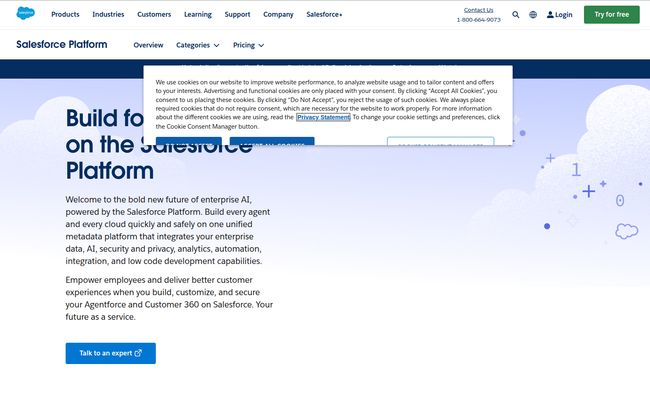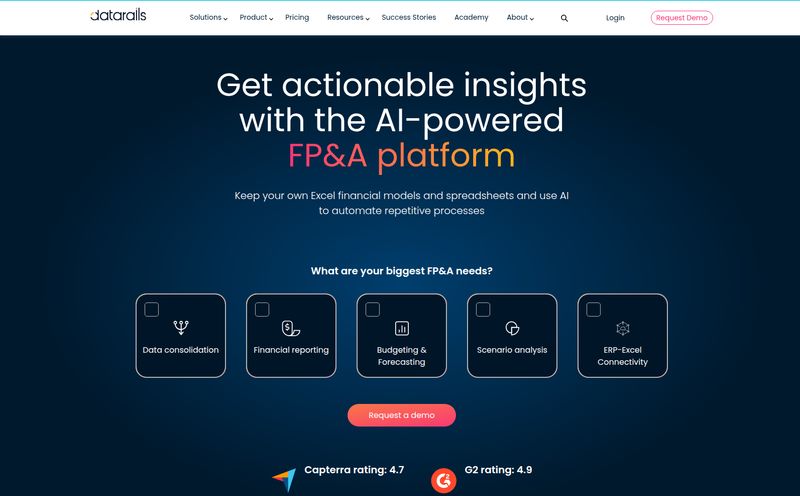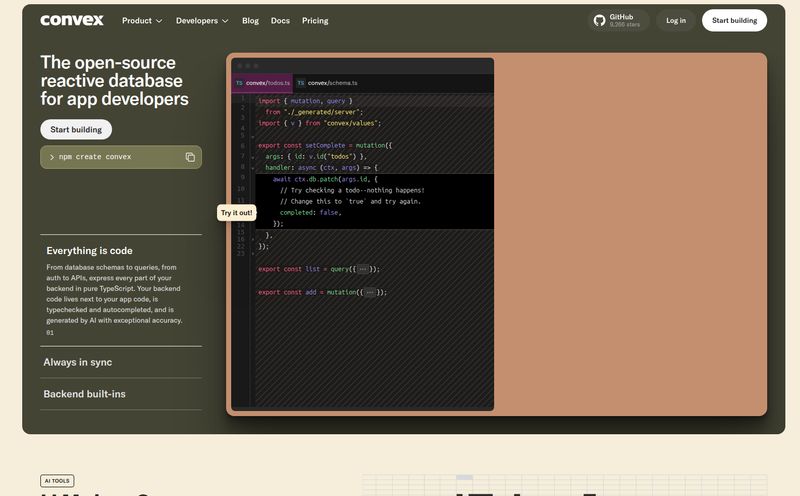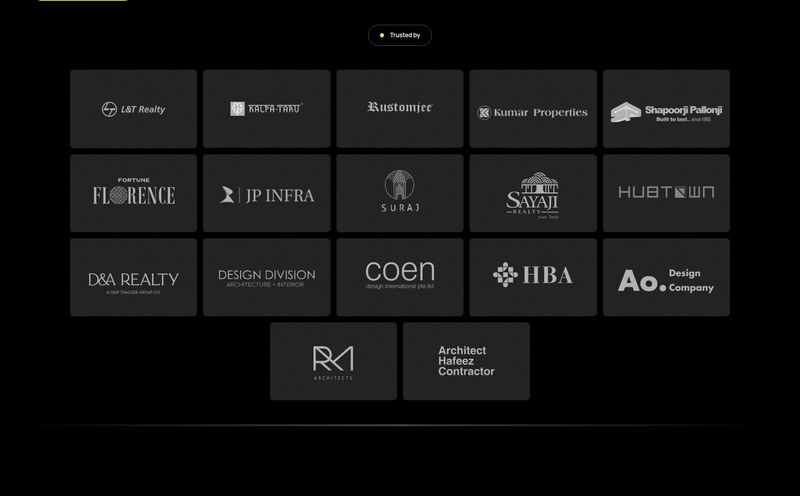If your company's tech stack looks anything like mine has over the years, it's probably a beautiful, chaotic mess. You've got one tool for analytics, another for customer support, a third for email marketing, and they all talk to each other with the grace of angry toddlers. It's a digital Frankenstein's monster held together with duct tape, Zapier, and a whole lot of prayer.
We've all been there. Juggling a dozen logins, trying to make sense of data that's spread across a half-dozen platforms... it's exhausting. And that’s the problem Salesforce is swinging for the fences to solve with its Salesforce Platform. You've heard the name, you've seen the cloud logo everywhere. But the question is, is this platform the grand unifier it claims to be, or is it just a bigger, more expensive box to put your problems in?
I’ve been in the SEO and traffic game for years, and I’ve seen platforms come and go. I’ve seen the game-changers and the over-hyped duds. So, let's pull back the corporate curtain and have a real chat about what the Salesforce Platform is, who it's for, and whether it's the right move for you.
What Exactly Is the Salesforce Platform?
First off, let's clear up a common misconception. When people hear "Salesforce," they immediately think "CRM." And they're not wrong, but that's like saying a smartphone is just a phone. The Salesforce Platform is the foundation upon which the famous CRM and everything else is built. Think of it less as a single tool and more like the entire workshop.
It's designed to bring five massive pillars of business tech under one roof: Data, AI, CRM, Development, and Security.
The magic, or at least the marketing-speak, is that it’s all built on a single, unified metadata platform. In plain English, that means everything is speaking the same language. An update to a customer's profile in the sales app is instantly reflected in the marketing automation tool and the customer service dashboard. No more messy integrations, no more data lag. At least, thats the dream.
It’s about creating a single source of truth. For your customer data (they call this Customer 360) and for your internal operations (what they're branding as Agentforce). It's an ambitious goal, and one that many have tried to achieve.

Visit Salesforce Platform
The Crown Jewels: A Look at the Core Features
Okay, so "unified platform" sounds great on a PowerPoint slide. But what are the actual tools in the workshop? Let's break down the components that really matter.
Taming the Data Beast with Data Cloud
Data is the lifeblood of any modern business, but it's often trapped in silos. Your website analytics are in GA4, your ad spend is in Google Ads, your customer history is in your CRM... you get the picture. The Data Cloud is Salesforce's attempt to be the ultimate data blender, pulling in information from all these disparate sources to give you a single, coherent view. This is the bedrock of their "Customer 360" promise.
Your In-House Genius: Einstein AI
AI is the buzzword of the decade, but Salesforce has been playing this game for a while with Einstein AI. It's not just a chatbot. It's woven into the fabric of the platform, doing things like predicting which sales leads are most likely to close, suggesting the next best action for a service agent, or analyzing customer sentiment. The image I saw boasted 1.9 trillion AI-powered predictions per week. That's a staggering number, and it shows they're serious about making AI a practical, everyday tool rather than a futuristic concept.
Building Apps Without Writing a Book of Code
This, for me, is one of the most interesting parts. The platform heavily pushes its low-code development capabilities. This means your marketing manager or a savvy operations lead can actually build simple applications, automate workflows, and create custom processes without needing to write a single line of code. It democratizes development. Of course, for the heavy-lifting, pro-code options are still there for your dev team. This flexibility is a huge plus.
The Unsung Heroes: Security, Automation, and Integration
These aren't the flashiest features, but they're the ones that make a C-suite sleep at night. Robust security and privacy controls are built-in, not bolted on. The automation tools are there to kill repetitive tasks and free up your team’s time—Salesforce's own stats claim it can lead to a 27% faster IT process completion. And the integration capabilities (using their MuleSoft acquisition) are what connect the platform to the outside world, ensuring it can talk to those legacy systems you just can't get rid of yet.
The Good, The Bad, and The Ecosystem
No platform is perfect. Anyone who tells you otherwise is selling something. So let's get into the real talk.
The biggest pro is right there in the pitch: unification. Having one system that handles so much can radically simplify your operations and lead to some seriously powerful insights. The scalability is also a huge draw. You can start with one piece and expand as you grow, knowing the foundation can handle it. The potential to reduce IT costs (they quote a 25% decrease) is also a massive carrot.
But—and this is a big but—it’s not a walk in the park. The main downside is complexity. This isn't a plug-and-play solution like some smaller SaaS tools. Implementing the Salesforce Platform is a serious project that requires careful planning and, often, specialized skills. There's a reason "Salesforce Administrator" is a full-time, well-paying job. It's a powerful beast, and you need someone who knows how to tame it.
Then there's the a reliance on the Salesforce ecosystem. Once you're in, you're really in. Moving off the platform can be a monumental task. It’s a strategic commitment, for better or for worse.
Let's Talk Money: Salesforce Platform Pricing
Alright, the all-important question: what's this going to cost me? Salesforce is famously a bit guarded with its pricing, but they do have public-facing numbers for the platform itself. Keep in mind these are just starting points.
| Plan | Price | Key Features |
|---|---|---|
| Platform Starter | $25 /user/month | Custom objects, process automation, Lightning App Builder, AppExchange access, employee identity, customizable reports and dashboards. |
| Platform Plus | $100 /user/month | Includes all Starter features. |
Now, if you're looking at that table and thinking, "Wait, the features look identical..." you're not crazy. This is classic enterprise software pricing. The difference between Starter and the much pricier Plus isn't in the basic tools, but in the limits. The real differentiators will be things like the number of custom objects you can create, API call limits, data storage capacity, and access to more advanced developer tools. You absolutely must talk to a sales representative to understand which tier you actually need. Don't get caught out by the fine print.
So, Who Is This Actually For?
I’ve seen businesses of all sizes try to make platforms like this work. In my experience, the Salesforce Platform finds its sweet spot with a specific type of company.
If you're a scrappy two-person startup, this is probably overkill. The cost and complexity will likely slow you down. But if you're a mid-sized company that's starting to feel the growing pains of a disconnected tech stack, or a large enterprise looking to consolidate and build a true digital nervous system for your operations, then you are the target audience. It's for businesses that are playing the long game and are willing to invest in a foundational technology that can grow with them for the next decade.
My Final Take: Is the Salesforce Platform Worth It?
After all is said and done, is it worth the investment? My answer is a classic consultant's two-word response: it depends.
The Salesforce Platform is undeniably powerful. It's one of the few contenders out there that can legitimately claim to offer a single, unified home for the core functions of a modern enterprise. The combination of data unification, practical AI, and low-code flexibility is incredibly compelling.
However, it is an investment in every sense of the word. It requires money, time, and talent to do it right. This isn’t a quick fix for your operational woes; it's a fundamental shift in how your company uses technology.
If you're looking for a simple tool to solve a single problem, look elsewhere. But if you’re at a point where you need to build a scalable, intelligent, and secure foundation for the future of your customer and employee experiences, then the Salesforce Platform should absolutely be on your evaluation list. Just be sure to go in with your eyes wide open and your best technical minds at the table.
Frequently Asked Questions
- What is an application development platform?
- An application development platform is a set of tools and services that allows developers (and sometimes non-developers) to build, deploy, and manage custom applications. The Salesforce Platform is an example, providing low-code and pro-code options to build on top of its core CRM and data infrastructure.
- Why is having an integrated platform so important?
- An integrated platform is important because it breaks down data silos. When your sales, marketing, and service systems are all built on the same foundation, they share the same data in real-time. This leads to better customer experiences, more efficient internal processes, and more accurate reporting and analytics.
- What are the main benefits of the Salesforce Platform?
- The main benefits include unifying your data in one place (Data Cloud), leveraging powerful AI for predictions and automation (Einstein AI), enabling faster app development with low-code tools, and ensuring high levels of security and privacy across all your business functions.
- How much does the Salesforce Platform actually cost?
- The listed pricing starts at $25/user/month for the Platform Starter plan and goes to $100/user/month for Platform Plus. However, the total cost will depend on your specific needs, the number of users, and any add-ons or customizations you require. The real cost is often in the details and limits of each plan.
- Is the Salesforce Platform only for large enterprise companies?
- While it's very popular in the enterprise space, it's not exclusively for them. Growing mid-sized businesses that need a scalable, all-in-one solution are also prime candidates. However, due to its complexity and cost, it might be too much for very small businesses or early-stage startups.
- Do I need to be a developer to use the Salesforce Platform?
- Not necessarily. One of its key features is its low-code and no-code capabilities, which empower business users to create simple apps and automate processes using drag-and-drop tools like the Lightning App Builder. For more complex applications and customizations, you would need development skills.
Reference and Sources
- Salesforce Platform Official Overview
- IDC Report: The Salesforce Economic Impact (Note: This is a sponsored report by Salesforce, but contains interesting ecosystem data).



